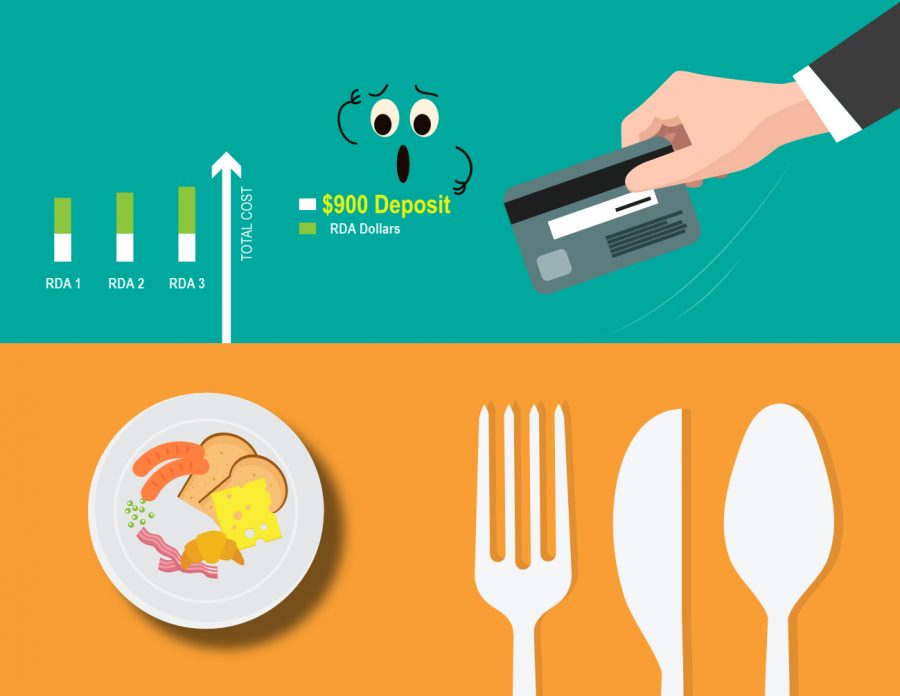OPINION: Allow RDA funds for off-campus students
Rethink the way WSU allows students to eat on campus and make it better
RDA can be pricey for students who live on campus, but with some savings. To help ease costs off-campus students should have the option for RDA.
February 7, 2020
Students at WSU that have spent any time in residence halls know the experience of using RDA. Also known as the Resident Dining Account, RDA is WSU’s standard food payment system for students, or at least students that live in residence halls on campus.
While RDA may seem like a nice option for students living in residence halls, there is little appeal for those who live off-campus. This system could use several improvements to connect with a larger portion of WSU’s student community.
A close look at how the RDA system functions shows that one of the first places for improvement is the availability of the RDA system to a greater number of students. While students can pay for meals at campus markets and dining halls with debit cards, cash and Cougar Cash, the RDA system solely applies to students living in campus residence halls.
RDA payments receive a 40 percent discount at campus dining halls and receive a 10 percent discount at campus markets.
Originally, discounts for RDA only existed at dining halls, but were expanded to campus markets in recent years. However, these discount rates are not available to students without the live-in RDA plan, which means that other forms of payment end up being more expensive in general.
As a result, RDA is used as the standard method of purchase at these markets.
“Occasionally I would have a student come in who would pay with a debit card or cash… but those occurrences were very rare,” said Jacob Denenholz, a junior kinesiology major and former cashier at the Market on Cougar Way.
Meanwhile, regardless of which of the three available RDA plans a student selects, they are required to pay a base charge of $900. According to WSU Dining Services, the base charge goes to cover utilities, maintenance, repairs, mortgage payments, and a portion of the labor needed to support the food service program. This charge is not included in a student account as spendable RDA dollars.
A potential improvement to both these problems could be a new type of RDA plan that either contains balances lower than the Level 1 Plan, or even potentially a plan catered specifically to off-campus students that could possibly include a lower base charge.
At the same time, other parts of the RDA system limit student flexibility when it comes to budgeting and spending. Normally, when students living in residence halls end a semester with leftover RDA dollars in their account, these RDA dollars carry over into the next semester as spendable currency.
Yet, this feature only applies to students who commit to living in residence halls for an additional semester. As for students planning to move out of residence halls, any leftover RDA dollars go to waste, as they do not carry over for future use, and according to WSU Dining Services, a refund system does not currently exist.
“It is use it or lose it right now. We try to work with the students and educate them and teach them to spend their dollars in a way that provides the most value,” said Sarah Larson, director of Residential Dining and Culinary Services at WSU Dining Services.
As noted, the university currently is using an educational approach that seeks to teach students how to properly budget their RDA dollars and manage their balances. However, simply allowing students to refund their leftover RDA dollars and receive them back as normal currency could provide even more flexibility to students.
While the university’s motive to educate students about budgeting is helpful, the practical result of this RDA limit is that students often make bulk purchases at markets and dining halls towards the end of each semester with their leftover money that won’t carry over.
“I would say the last three weeks of school, so maybe the week before dead week, students would start coming in and buying probably three hundred [to] four hundred dollars’ worth of food just simply to get rid of their RDA because it doesn’t roll over to the next semester,” Denenholz said.
Large purchases like these are hardly realistic to an average college student and could be rendered unnecessary if leftover RDA dollars were able to be refunded, rather than forced to be spent.
Overall, while the current RDA system has been a staple of student life on campus for decades, certain updates to the system could provide more flexibility to, and therefore increased use by, students.





















